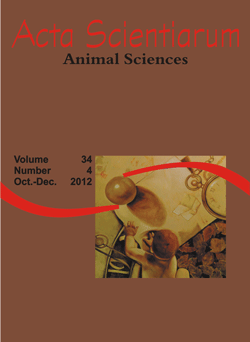<b>Pesticides in the propolis at São Saulo State, Brazil</b> - doi: 10.4025/actascianimsci.v34i4.15859
Abstract
The increasing demand for propolis has caused a raise in its production. However, an increasingly pesticide-dependent agriculture is a great concern with regard to bees, their produce and environmental contamination. Current analysis evaluates the presence of pesticides (organochlorines, organophosphates, pyrethroids, carbamates, herbicides, fungicides and acaricides) in samples of propolis from the state of São Paulo, Brazil. Beekeepers from several localities in the state provided samples of propolis (50), which were collected, stored in non-toxic plastic bags and maintained in a freezer for analyses. Possible pesticide residues were examined by gas chromatography method but no pesticide residues were detected in the examined propolis samples. Propolis analyzed in the state of São Paulo did not show any pesticide contamination.
Downloads
DECLARATION OF ORIGINALITY AND COPYRIGHTS
- I Declare that current article is original and has not been submitted for publication, in part or in whole, to any other national or international journal.
The copyrights belong exclusively to the authors. Published content is licensed under Creative Commons Attribution 4.0 (CC BY 4.0) guidelines, which allows sharing (copy and distribution of the material in any medium or format) and adaptation (remix, transform, and build upon the material) for any purpose, even commercially, under the terms of attribution.
Read this link for further information on how to use CC BY 4.0 properly.








































